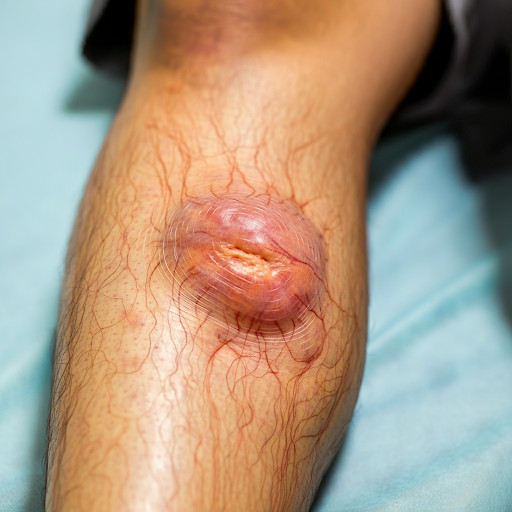Venous ulcers are a common type of wound that can be painful and slow to heal. They typically form on the lower legs, often around the ankles, and are caused by problems with blood circulation in the veins.
At Professional Home Care Services, we understand the challenges of living with venous ulcers. Our experienced home health care nurses can provide specialized care and support to help you heal and manage your condition in the comfort of your own home.
What Sets Venous Ulcers Apart?
While several types of ulcers can affect the lower legs, venous ulcers have distinct characteristics:
- Location: They usually appear below the knee, often around the inner ankle.
- Appearance: They may look shallow with irregular edges and have a red or brown base. The surrounding skin may be swollen, discolored, or hardened.
- Symptoms: Pain, itching, and a feeling of heaviness in the legs are common.
Unlike other types of ulcers, such as arterial ulcers or diabetic ulcers, venous ulcers stem from damaged or weakened valves in the veins. These valves normally help blood flow back up towards the heart. When they malfunction, blood can pool in the lower legs, leading to increased pressure and damage to the surrounding tissue.
Who is at Risk?
While anyone can develop venous ulcers, certain factors increase your risk:
- Age: Older adults are more susceptible.
- Family history: A family history of venous disease can increase your risk.
- Obesity: Excess weight puts added pressure on the veins.
- Prolonged standing or sitting: Lack of movement can hinder blood flow.
- Previous blood clots: Blood clots can damage vein valves.
- Varicose veins: These enlarged, twisted veins are a common sign of venous insufficiency.
Treatment Options
The primary goal of venous ulcer treatment is to promote healing and prevent recurrence. This often involves a combination of approaches:
- Compression therapy: Wearing compression stockings or bandages helps improve blood flow and reduce swelling.
- Wound care: Regular cleaning and dressing of the wound are crucial to prevent infection and promote healing.
- Medications: Topical or oral medications may be prescribed to manage pain, reduce inflammation, or prevent infection.
- Lifestyle changes: Elevating your legs, exercising regularly, and maintaining a healthy weight can improve circulation and aid healing.
- Endovenous procedures: Minimally invasive procedures may be recommended to treat underlying vein problems.
How Home Health Care Can Help
Managing venous ulcers can be challenging, but our skilled home health care nurses can provide personalized care and support in the comfort of your home. Our services include:
- Wound care: Our nurses are trained in proper wound cleaning, dressing changes, and monitoring for signs of infection.
- Medication management: We can assist with medication reminders and ensure you’re taking them as prescribed.
- Compression therapy: We can help you properly apply and care for compression stockings or bandages.
- Education and support: We provide guidance on lifestyle changes, nutrition, and other strategies to promote healing and prevent recurrence.
- Pain management: We work with you and your physician to develop a pain management plan that addresses your individual needs.
The Role of Nutrition in Healing
Proper nutrition plays a vital role in wound healing. For venous ulcers, focus on:
- Protein: Adequate protein intake is essential for tissue repair. Include lean meats, poultry, fish, beans, lentils, and dairy products in your diet.
- Vitamin C: This vitamin is crucial for collagen production, which is essential for wound healing. Consume citrus fruits, berries, tomatoes, and leafy green vegetables.
- Zinc: Zinc supports the immune system and aids in cell growth and repair. Good sources include meat, seafood, nuts, and seeds.
- Iron: Iron is necessary for oxygen transport and wound healing. Include iron-rich foods like red meat, spinach, and fortified cereals.
Challenges in Healing
Venous ulcers can be slow to heal and prone to recurrence. Several factors can complicate the healing process:
- Infection: Open wounds are susceptible to infection, which can delay healing.
- Poor circulation: Underlying venous insufficiency can hinder blood flow and nutrient delivery to the wound.
- Malnutrition: Inadequate nutrition can impair the body’s ability to heal.
- Immobility: Lack of movement can worsen circulation and increase the risk of complications.
- Non-compliance: Not following treatment recommendations, such as wearing compression stockings, can hinder healing.
Our home health care team can help address these challenges by providing expert care, education, and support. We work closely with you and your physician to develop a comprehensive treatment plan that promotes healing and improves your quality of life.
If you or a loved one is struggling with venous ulcers, contact Professional Home Care Services today. Our compassionate team can provide the specialized care and support you need to heal and regain your independence.
Remember that home health care must be ordered and certified by your physician. For more information about qualifying for skilled home health services including wound care, click here: https://www.phcsonline.com/blog1/medicare-home-health-benefit-do-you-qualify/

Recent Comments